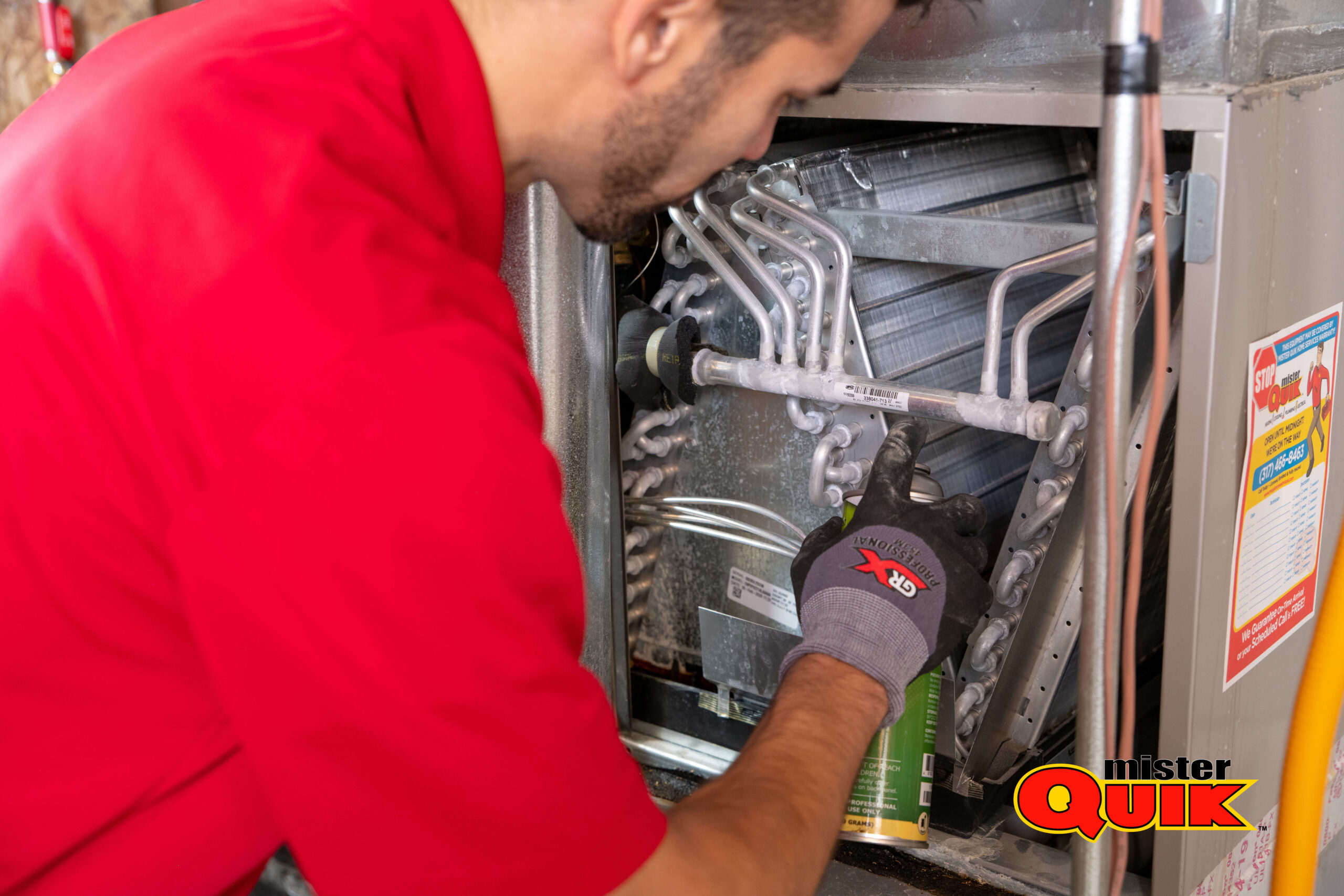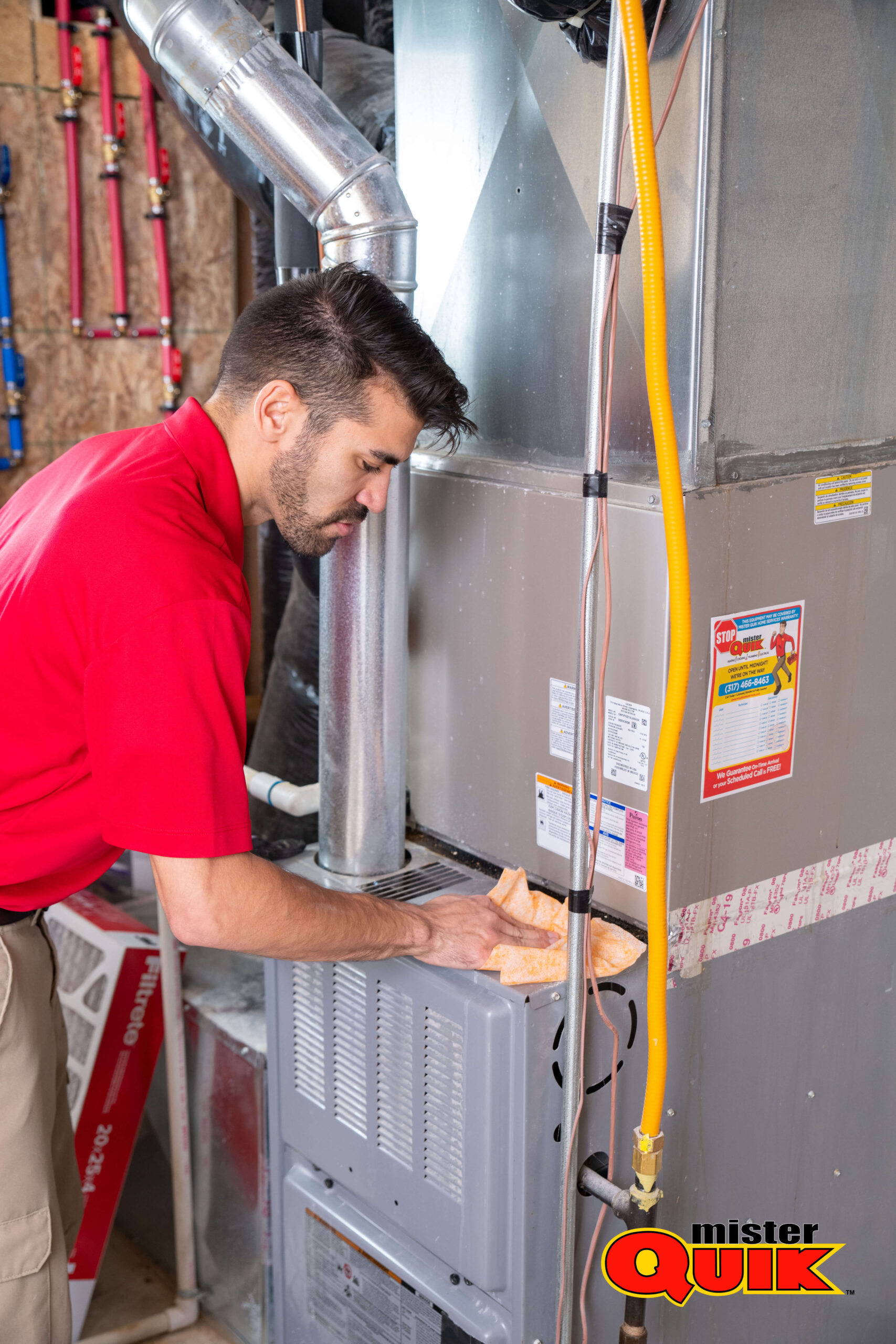Heating and Cooling Near Me
Schedule on your own without making a call. Click the button below to get started!

Residential Heating in Bloomington
When temperatures plummet or soar, having reliable heating and cooling systems in your home is essential for comfort and safety. Here’s what you need to know about residential heating services in Bloomington:
- Heating Solutions: In Bloomington, having a properly functioning heating system is crucial during the chilly winters. Whether it’s a furnace, heat pump, or boiler, a well-maintained heating system ensures your home stays warm and cozy when the cold weather strikes.
- Professional Maintenance: Regular maintenance of your heating and cooling systems is key to their longevity and efficiency. Professional HVAC technicians in Bloomington can perform inspections, cleanings, and tune-ups to ensure your system is running smoothly.
- Emergency Repairs: Heating and cooling emergencies can happen unexpectedly, leaving you uncomfortable in extreme temperatures. Fortunately, many HVAC companies in Bloomington offer emergency repair services to quickly address issues such as breakdowns or malfunctions.
- Energy Efficiency: Upgrading to energy-efficient heating and cooling systems not only reduces your carbon footprint but also saves you money on utility bills. Consider investing in modern, high-efficiency HVAC equipment to improve comfort and lower energy costs in your Bloomington home.
- Indoor Air Quality: Along with heating and cooling, indoor air quality plays a significant role in maintaining a healthy and comfortable home environment. HVAC professionals can offer solutions such as air purifiers, humidifiers, and ventilation systems to enhance indoor air quality.
In Bloomington, ensuring your residential heating and cooling systems are in top condition is vital for year-round comfort and peace of mind.
Heating Systems
Here’s a breakdown of the different options available for heating and cooling your home:
Furnaces are one of the most common heating systems found in homes. They work by blowing heated air through ducts to distribute warmth evenly throughout the house. Furnaces can run on various fuels such as natural gas, propane, or electricity, providing versatility in different locations.
Heat pumps offer both heating and cooling capabilities, making them a versatile choice for homeowners. They operate by transferring heat between the indoor and outdoor air, providing efficient heating in the winter and cooling in the summer. Heat pumps are known for their energy efficiency and can be a cost-effective option for heating and cooling your home.
Boilers heat water, which is then circulated through radiators or radiant floor systems to provide warmth. They are known for their quiet operation and even heat distribution, making them a popular choice for many homeowners. Boilers can run on various fuels, including natural gas, oil, or electricity.
Ductless mini-split systems consist of an outdoor compressor unit and one or more indoor air-handling units. They are a great option for homes without ductwork or for room additions where extending ductwork is not feasible. Ductless mini-split systems offer both heating and cooling capabilities and provide excellent energy efficiency.
The cheapest way to heat a house largely depends on factors such as location, climate, and the type of heating system available. Generally, utilizing natural gas or propane tends to be cost-effective in regions where these fuels are readily accessible and affordable. Alternatively, electric heating methods like heat pumps or electric resistance heating can be economical in areas with low electricity rates or mild climates. Implementing energy-efficient practices, such as proper insulation and sealing drafts, can significantly reduce heating costs regardless of the heating source. Additionally, exploring renewable energy options like solar heating may offer long-term savings, albeit with higher initial investment costs.
The most efficient form of heating depends on various factors such as climate, insulation, and energy costs. Generally, heat pumps are highly efficient, particularly in moderate climates, as they transfer heat rather than generate it. Additionally, newer models often incorporate advanced technology for further efficiency gains. However, the effectiveness of heating methods also relies on proper insulation and home design to minimize heat loss. In some cases, alternative options like radiant floor heating or biomass systems can offer high efficiency when appropriately implemented and maintained.
The cheapest heating system to install depends on various factors such as the type of fuel available, the size of the property, and installation costs. Generally, electric heating systems like electric baseboard heaters or portable space heaters tend to have lower upfront installation costs compared to systems requiring complex ductwork or piping. However, the long-term operational costs, including electricity bills, should also be considered in determining the most cost-effective option. Additionally, energy-efficient models and insulation measures can significantly impact overall expenses over time.
The newest way to heat your home involves innovative advancements in smart heating systems, such as smart thermostats and zone-controlled heating. These systems utilize AI algorithms to learn your preferences and adjust temperatures accordingly, optimizing energy efficiency. Additionally, technologies like heat pumps, particularly air-source and ground-source varieties, are gaining popularity for their eco-friendly operation and cost-effectiveness. Integrating renewable energy sources like solar panels further reduces reliance on traditional heating methods, offering a sustainable solution for modern homes.
The best heating system for an old house depends on various factors including the house’s layout, insulation, and existing infrastructure. Generally, retrofitting with a modern, efficient boiler or furnace can provide reliable and even heating throughout the space. Alternatively, ductless mini-split systems offer flexibility and energy efficiency, particularly in houses without existing ductwork. For those seeking a more eco-friendly option, radiant floor heating can provide comfortable warmth while preserving the historic aesthetic of the house. Ultimately, consulting with a heating specialist can help determine the most suitable system based on the specific needs and constraints of the old house.
Reliable Heating and Air
When it comes to ensuring comfort in your home, having reliable heating and air handling systems is essential. Here are key characteristics to look for in heating and cooling systems:


Reliable heating and air handling systems maintain consistent performance, keeping your home comfortable regardless of external temperatures.
A reliable system should be durable and able to withstand regular use without frequent breakdowns or repairs.
Efficient heating and cooling systems help reduce energy consumption and lower utility bills. Look for systems with high Energy Star ratings to ensure optimal efficiency.
Proper air handling ensures efficient distribution of heated or cooled air throughout your home, eliminating hot or cold spots and maintaining even temperatures.
Advanced control systems allow you to adjust heating and cooling settings easily, providing personalized comfort and energy savings.
Best Heating in Bloomington
When it comes to finding the best heating service in Bloomington, several factors contribute to an exceptional experience:


The best heating service providers in Bloomington respond promptly to heating and cooling issues, ensuring your comfort is restored without delay.


Look for heating professionals with extensive expertise and experience in diagnosing and repairing a wide range of heating and cooling systems.


Clear and transparent communication is key to a positive heating service experience. The best providers in Bloomington explain the issue, available solutions, and associated costs upfront, keeping you informed every step of the way.
Heating System Cost
Understanding the total cost of a heating system involves more than just the initial purchase or installation expenses. Here’s what may not be included in the calculation of heating and cooling costs:
1. Maintenance and Repairs:
Over time, heating systems require maintenance and occasional repairs to keep them running efficiently. These ongoing costs should be factored into your budget for heating and cooling.
2. Energy Consumption:
The efficiency of your heating system affects your ongoing energy bills. High-efficiency systems may have higher upfront costs but can result in lower heating and cooling expenses over time.
3. Ductwork Installation or Repair:
If your heating system relies on ductwork for distribution, the condition of existing ducts or the need for new ductwork can impact the overall cost of installation or repairs.
4. Thermostat Upgrades:
Upgrading to a programmable or smart thermostat can improve energy efficiency and comfort but may require additional investment beyond the initial heating system cost.
5. Indoor Air Quality Accessories:
Additional accessories such as air purifiers, humidifiers, or ventilation systems can improve indoor air quality but may incur extra expenses beyond the heating system itself.
Types of Heating Systems
When it comes to heating and cooling your home, there are several types of heating systems to consider:
Furnaces are the most common type of heating system, using either gas, oil, or electricity to heat air, which is then distributed throughout the home via ductwork. Furnaces are known for their efficiency and ability to quickly heat large spaces.
Heat pumps are versatile heating and cooling systems that can extract heat from the air or ground and transfer it indoors during the winter months. In the summer, they reverse this process to provide cooling. Heat pumps are energy-efficient and environmentally friendly options for heating and cooling your home.
Boilers heat water, which is then circulated through radiators, baseboard heaters, or radiant floor systems to provide warmth. Boilers can run on various fuels, including gas, oil, or electricity, and are known for their even heat distribution and quiet operation.
Ductless mini-split systems consist of an outdoor compressor unit and one or more indoor air-handling units. These systems are ideal for homes without existing ductwork or for room additions. Ductless mini-split systems offer both heating and cooling capabilities and are highly energy-efficient.
By implementing these energy-efficient measures, you can significantly reduce your heating costs and enjoy a more comfortable living environment.
- Ensure the thermostat is set to “Heat” mode during cold weather.
- Verify the thermostat temperature setting is higher than the current room temperature.
- Check air filters for dirt or debris buildup that may restrict airflow.
- Replace dirty filters with clean ones to improve heating and cooling efficiency.
- Check circuit breakers to ensure heating and cooling systems are receiving power.
- Reset tripped breakers and monitor for any additional issues.
- Check the pilot light to ensure it’s lit and burning blue.
- If the pilot light is out, follow the manufacturer’s instructions to relight safely.
- Ensure all vents and registers are open and unobstructed to allow proper airflow.
- Remove any furniture or debris blocking vents to improve heating and cooling distribution.






